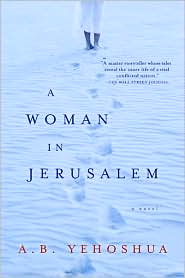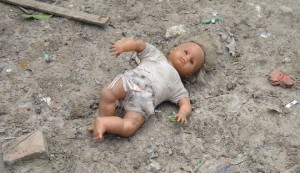“What was he fighting for?…Was it to reclaim the dignity of [a dead woman] come from afar to be a cleaning woman in Jerusalem? To let her know—her and whoever had loved her—that her suffering and death hadn’t gone unnoticed because of anyone’s callousness?”
 A Jerusalem bombing results in the death of an unidentified forty-eight-year-old woman, after she has been comatose for two days. Unvisited at the hospital during the last days of her life, she remains, unmourned, in the local morgue for more than a week, until a pay stub finally traces her to the bakery where she worked. When an aggressive newspaper reporter breaks the story of the unmissed and unmourned employee, the bakery’s eighty-seven-year-old owner is both embarrassed by the publicity and furious at the story’s accusations that the woman was treated callously by the bakery’s management. For the owner, an apology on behalf of the company is not enough. He assigns the human resources manager to find out who the woman is so that “a more tangible expression of regret from himself and his staff, a clearly defined gesture” can be made on her behalf.
A Jerusalem bombing results in the death of an unidentified forty-eight-year-old woman, after she has been comatose for two days. Unvisited at the hospital during the last days of her life, she remains, unmourned, in the local morgue for more than a week, until a pay stub finally traces her to the bakery where she worked. When an aggressive newspaper reporter breaks the story of the unmissed and unmourned employee, the bakery’s eighty-seven-year-old owner is both embarrassed by the publicity and furious at the story’s accusations that the woman was treated callously by the bakery’s management. For the owner, an apology on behalf of the company is not enough. He assigns the human resources manager to find out who the woman is so that “a more tangible expression of regret from himself and his staff, a clearly defined gesture” can be made on her behalf.
The resources manager investigates the background of the woman, who was unknown to him, even though he had apparently interviewed her for a job, and he soon discovers that the woman, Yulia Ragayev, a mechanical engineer from Russia, worked as a member of the night-time cleaning crew in the bakery. She had left her job the month before the bombing, a fact that comes as a welcome relief to the resources manager, since this means the company has no responsibility, but further investigation shows that though she was no longer employed, she was still collecting her tiny salary.

The mystery of the woman’s identity and how and why she came to Jerusalem soon develops into a touching love story involving her time at the bakery. At the same time, the resources manager becomes obsessed with her, learning about her life and her dreams, visiting the shack where she lived, and coming to “know” her. Yehoshua cleverly draws in the reader by creating empathy for Yulia, showing details about her life in Jerusalem and those she has loved who have abandoned her. He uses symbolic details to set off the action, creating parallels and contrasts—the warm, homey smell of the bakery contrasting with the horrors of the bombing, the abandoned doll of a barefoot monk in Julia’s shack providing a touching parallel to the cold poverty of her own life.
Serious thematic questions arise: Who is responsible for Yulia in Jerusalem? She herself? Her employer? The people who knew and liked her? The government in Jerusalem? Her family back home? No one? And if she is not solely responsible for her own life, how much, if anything, does anyone else owe to her?
Continuing news paper publicity, all negative, leads the bakery owner to insist on memorializing Yulia and to seeing that she has a dignified funeral, and he eventually assigns the resources manager to escort her body back to the Russian village she came from so she can be buried there. The timid human resources manager soon learns more than he ever bargained for about Yulia, life, bureaucracy, and ultimately, about the human resources he himself possesses.
paper publicity, all negative, leads the bakery owner to insist on memorializing Yulia and to seeing that she has a dignified funeral, and he eventually assigns the resources manager to escort her body back to the Russian village she came from so she can be buried there. The timid human resources manager soon learns more than he ever bargained for about Yulia, life, bureaucracy, and ultimately, about the human resources he himself possesses.
Wonderfully dark humor gradually emerges from the ironies that occur on the Russian journey, with Yehoshua emphasizing the continuing absurdity of life. The hostile newspaper reporter (“the weasel”) and his photographer (“the snake”) accompany the resources manager and the coffin on the plane to Russia, forcing the resources manager to examine his mission at the same time that the reporter and photographer reveal their own not-always-honorable motivations. Transporting the coffin from the airport to the bleak Russian steppes, they use the only vehicle available–a demobilized armored personnel carrier. The manager is forced to pay bribes, both to the authorities and to Yulia’s family, to a ccept the coffin, and as he travels farther and farther into the bleak interior of the Russian steppes, a terrible winter storm approaches. The manager spends time living underground while the coffin remains unburied, out in the open. The action soon develops into a full-scale slapstick comedy of noir elements, with the manager announcing that “Atonement was turning into lunacy.”
ccept the coffin, and as he travels farther and farther into the bleak interior of the Russian steppes, a terrible winter storm approaches. The manager spends time living underground while the coffin remains unburied, out in the open. The action soon develops into a full-scale slapstick comedy of noir elements, with the manager announcing that “Atonement was turning into lunacy.”
With an ending that readers will celebrate for its perfection, Yehoshua brings the action, themes, and characters full circle, showing the growth of the human resources manager, his pragmatism (learned on the trip), and his awareness of the larger mission with which he was entrusted. This novel about “a dead temporary resident who believed in Jerusalem more than Jerusalem believes in itself” is certainly one of the best and most satisfying novels I have read all year. (On my Favorites List for 2006)
Notes: Also reviewed here: Yehoshua’s FRIENDLY FIRE and THE RETROSPECTIVE
The author’s photo is from http://www.jewishbookweek.com
The abandoned doll is from http://www.sgmlifewords.com/canada
The photo of the steppes is part of a story of exploration by http://www.curiousoyster.co.uk
The film The Human Resources Manager, winner of several Israeli Academy Awards, is based on this novel. (Double clicking will bring this to full screen mode, and pressing ESC will reduce it.) The trailer for the film follows:
